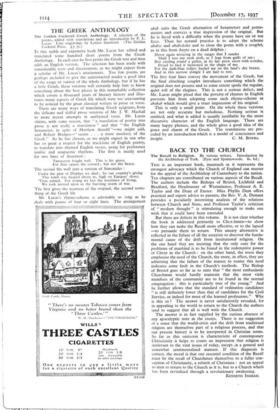BACK TO THE CHURCH
THIS is an important book, inasmuch as it represents the strongest advocacy which the Church of England can muster
for the appeal of the Archbishop of Canterbury to the nation.
Ten chapters are contributed on various aspects of the Recall. The authors include the Bishops of Bristol, Lichfield and Bradford, the Headmaster of Westminster, Professor A. E.
Taylor and the Dean of Exeter. Miss Phyllis Dent offers practical and expert advice to parents, the Rev. V. A. Demant provides a peculiarly interesting analysis of the relations between Church and State, and Professor Taylor's criticism of " modern thought " is stimulating enough to make one wish that it could have been extended.
But there are defects in this volume. It is not clear whether the book is addressed primarily to Churchmen—to show how they can make the Recall more effective, or to the lapsed —to persuade them to return. This uneasy alternative is reflected in the failure of all the essayists to discover the funda- mental cause of the drift from institutional religion. On the one hand they are insisting that the only cure for the problems of mankind is to be found in the redemptive power of Christ in the Church : on the other hand, the more they emphasise the need of the Church, the more, in effect, they are admitting that the failure of the masses to realise this need indicates some fault in the Church's methods. The Bishop of Bristol goes so far as to state that " the most enthusiastic Churchman would hardly maintain that the most virile members of the community are to be found in the normal congregation : this is particularly true of the young." And he further allows that the standard of ordination candidates " is still definitely lower than that of candidates for the Civil Service, or indeed for most of the learned professions." Why is this so ? The answer is never satisfactorily revealed, for in appealing to the world to return to the Church the authors tend to suggest that all is well with the Church.
The answer is in fact supplied by the curious absence of any apocalyptic note in the essays. There is no suggestion of a sense that the world-crisis and the drift from traditional religion are themselves part of a religious process, and that our present history is to be interpreted in Christian terms. So far as this omission is characteristic of contemporary Christianity it helps to create an impression that religion is irrelevant to the vital issues of today, except.,:n a general and somewhat sentimentalised manner. If this diagnosis is correct, the moral is that one essential condition of the Recall must be the recall of Churchmen themselves to a fuller con- ception of Christianity, a rebirth of Christians : not an appeal to men to return to the Church as it is, but to a Church which has been revitalised through a revolutionary awakening.
KENNETH INGRAM.














































 Previous page
Previous page